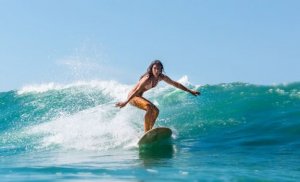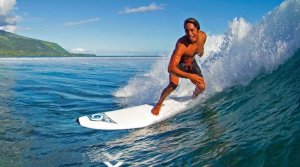The Important Aspects of the Surfer's Diet

Even though it may not seem like it, surfing is a sport with complex physical demands. The risks in the water require following a special diet that’s different from other disciplines. The surfer’s diet should be aimed towards replenishing muscle glycogen.
Following the fisherman’s diet
If we analyze it properly, surfing is a sport that people naturally practice on beaches and coasts. That’s where we can see surfers with an adequate body shape for this sport. This is not the work of luck: their regular diet provides them with optimum performance.

In fact, the fisherman’s diet is influenced by the sea. In these localities, people mostly eat fish. Beef cuts and even chicken are not usually part of the main diet.
It would also be more appropriate to eat carbohydrates such as rice and pasta rather than legumes. These characteristics come together in the ability these people have to move around properly in the sea. Evidently, this diet protects their bodies.
The surfer’s diet: many carbs
Unlike other sports that require more protein, the surfer’s diet is composed of a lot of carbohydrates. Between 60 and 70 percent of this plan consists of simple and complex carbs. Flour, rice, pasta, and bread are present in large quantities.
In other sports, this could cause an excess of sugar that could turn into fat reservoirs. However, the aquatic exercise is so intense that all calories are burned instantly. Besides, surfing is a sport that can go on for hours in each competition and training session.
On the other hand, foods with high protein contents may be problematic. They could possibly cause indigestion, dizziness and other gastrointestinal problems. Surfers must turn to alternative protein sources such as fruits and milk.

How should they eat their carbohydrates?
It all depends on the build and weight of each surfer. For casual and amateur surfers, 7 grams per kilogram of body weight should be enough. This is in case each session lasts for 30 to 60 minutes approximately.
For more experienced surfers, the number almost doubles. This type of diet works for almost any sport that requires a constant effort for hours on end.
Surfers should eat an uncontrolled diet. In reality, this type of sport can benefit from eating constantly throughout the day. The right thing to do is eating several small meals. The meal before a competition should be full of energy, but small.
Beware of dehydration
Even though we’re surrounded by the sea, the surfer’s diet should contain a lot of water. Continuous physical wear and high beach temperatures contribute to quick dehydration. In the midst of the swim, the only thing in our favor is the pleasant thermal sensation.
A key point is to avoid diuretic drinks since they contribute to the loss of body fluids. Just like in sports such as diving, caffeine, alcoholic beverages, and carbonated drinks should be under restriction.
Being dehydrated in water can have dangerous consequences. Passing out or having low blood pressure could lead to drowning. The body would react differently in this environment, and medical attention would be harder.
Light diet before going in the water
Before training and competing, we should be careful to keep digestion light. We should use the day before the competition to stock up on calories. The most essential thing in these cases is to have the proper energy resources.
The surfer’s diet includes milk, natural juices and whole fruits for breakfast. To this, we can add green and fresh vegetables, rich in water. After a competition, there will be enough time to replenish the proteins. Fish, eggs and cold meats can’t be missing from this stage.
Even though it may not seem like it, surfing is a sport with complex physical demands. The risks in the water require following a special diet that’s different from other disciplines. The surfer’s diet should be aimed towards replenishing muscle glycogen.
Following the fisherman’s diet
If we analyze it properly, surfing is a sport that people naturally practice on beaches and coasts. That’s where we can see surfers with an adequate body shape for this sport. This is not the work of luck: their regular diet provides them with optimum performance.

In fact, the fisherman’s diet is influenced by the sea. In these localities, people mostly eat fish. Beef cuts and even chicken are not usually part of the main diet.
It would also be more appropriate to eat carbohydrates such as rice and pasta rather than legumes. These characteristics come together in the ability these people have to move around properly in the sea. Evidently, this diet protects their bodies.
The surfer’s diet: many carbs
Unlike other sports that require more protein, the surfer’s diet is composed of a lot of carbohydrates. Between 60 and 70 percent of this plan consists of simple and complex carbs. Flour, rice, pasta, and bread are present in large quantities.
In other sports, this could cause an excess of sugar that could turn into fat reservoirs. However, the aquatic exercise is so intense that all calories are burned instantly. Besides, surfing is a sport that can go on for hours in each competition and training session.
On the other hand, foods with high protein contents may be problematic. They could possibly cause indigestion, dizziness and other gastrointestinal problems. Surfers must turn to alternative protein sources such as fruits and milk.

How should they eat their carbohydrates?
It all depends on the build and weight of each surfer. For casual and amateur surfers, 7 grams per kilogram of body weight should be enough. This is in case each session lasts for 30 to 60 minutes approximately.
For more experienced surfers, the number almost doubles. This type of diet works for almost any sport that requires a constant effort for hours on end.
Surfers should eat an uncontrolled diet. In reality, this type of sport can benefit from eating constantly throughout the day. The right thing to do is eating several small meals. The meal before a competition should be full of energy, but small.
Beware of dehydration
Even though we’re surrounded by the sea, the surfer’s diet should contain a lot of water. Continuous physical wear and high beach temperatures contribute to quick dehydration. In the midst of the swim, the only thing in our favor is the pleasant thermal sensation.
A key point is to avoid diuretic drinks since they contribute to the loss of body fluids. Just like in sports such as diving, caffeine, alcoholic beverages, and carbonated drinks should be under restriction.
Being dehydrated in water can have dangerous consequences. Passing out or having low blood pressure could lead to drowning. The body would react differently in this environment, and medical attention would be harder.
Light diet before going in the water
Before training and competing, we should be careful to keep digestion light. We should use the day before the competition to stock up on calories. The most essential thing in these cases is to have the proper energy resources.
The surfer’s diet includes milk, natural juices and whole fruits for breakfast. To this, we can add green and fresh vegetables, rich in water. After a competition, there will be enough time to replenish the proteins. Fish, eggs and cold meats can’t be missing from this stage.
This text is provided for informational purposes only and does not replace consultation with a professional. If in doubt, consult your specialist.








